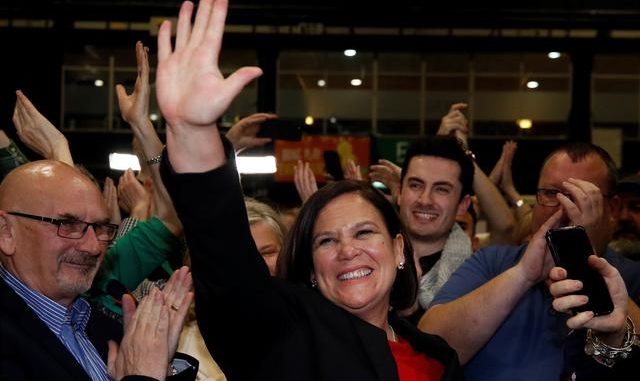
Sinn Fein on Monday said it wanted a major role in Ireland’s next government after a record election showing, a move that would raise its central goal of reunification with Northern Ireland near the top of the agenda in Dublin for the first time.
The left-wing Irish nationalist party stunned the establishment by beating the two center-right parties that have led every government in the country’s history, almost doubling its vote share from the last election to 24%.
RELATED COVERAGE
- Factbox: What happens next after Ireland’s ‘ballot-box revolution’
- Ireland’s Fine Gael said will try to form a government
See more stories
Sinn Fein’s low number of candidates meant, however, that it could fall just short of the largest number of seats when two days of counting nears conclusion later on Monday – likely behind the center-right Fianna Fail but potentially above Prime Minister Leo Varadkar’s Fine Gael.
Successive surveys suggested the Sinn Fein surge was based almost exclusively on the major campaign issues of healthcare and the high cost and low availability of housing, with the idea of Irish unity barely registering with voters.
However the former political wing of the Irish Republican Army said ahead of the vote that a condition for any coalition would be immediate preparations for a referendum on unity with Northern Ireland, a British province, that it would push London to hold within five years.
“This election has been a very clear message to the old two of the political establishment that their days of domination are over,” Sinn Fein leader Mary Lou McDonald told reporters.
“People want new politics and I believe Sinn Fein will be the core of that.”FILE PHOTO: Sinn Fein leader Mary Lou McDonald reacts after the announcement of voting results in a count centre, during Ireland’s national election, in Dublin, Ireland, February 9, 2020. REUTERS/Phil Noble
Both Fine Gael and Fianna Fail have insisted for years that they would not govern with Sinn Fein, citing differing economic policies and its past links to the IRA. The militant group fought against British rule in Northern Ireland in a conflict in which some 3,600 people were killed before a 1998 peace deal.
Fine Gael repeated its insistence on Monday while Fianna Fail said it saw significant hurdles to such a tie-up. Fine Gael and Fail have themselves never formed a coalition together. Varadkar presided over a minority government.
“We certainly will engage with them (Sinn Fein). We’re not going to refuse to talk,” Fianna Fail deputy leader Dara Calleary told RTE. “But let’s be in no doubt that those policy difficulties and those principles are still difficult hurdles.”
With 134 of 160 seats filled, Adrian Kavanagh, a politics lecturer at National University Ireland Maynooth who specializes in constituency analysis, forecast that Fianna Fail would win 39 seats, with 37 going to Sinn Fein and 36 to Fine Gael.
A combination of two of those parties would require the support of other lawmakers or smaller parties.Slideshow (3 Images)
BORDER POLL?
Under the 1998 Good Friday deal that mostly ended decades of violence between Catholic nationalists seeking to merge Northern Ireland with Ireland and Protestant unionists who want it to remain part of the United Kingdom, Britain’s minister for the region can call a referendum if a “yes” majority looks likely.
A vote would also be required in Ireland and an exit poll on Sunday showed that 57% of voters backed holding one within five years. Eighty-one percent of Sinn Fein supporters want a poll, compared to 52% of Fianna Fail voters and 44% among Fine Gael.
In its election manifesto, Sinn Fein said it wanted to establish a parliamentary committee and citizens assembly to plan for Irish unity.
McDonald, whose party members sang Irish rebel songs and flew the Irish tricolor flag as candidate after candidate were elected on Sunday, believes Britain would only consider calling a poll when Ireland is pro-actively planning for unification.
Fianna Fail and Fine Gael also want to see the unification of the island – partitioned almost a century ago – but say now is not the time. Fianna Fail pledged in its manifesto to start some preparations, but nowhere near the level Sinn Fein wants.
“One quarter of the vote is hardly a stunning endorsement of the idea that there should be a border poll,” Jeffrey Donaldson, a senior member of the pro-British Democratic Unionist Party, which shares power with Sinn Fein in Northern Ireland, told BBC.
DUBLIN (Reuters) –
